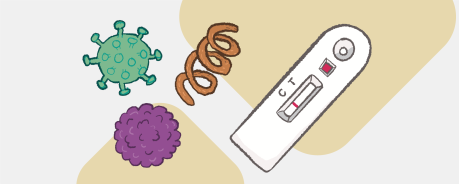Rapid test on HIV and STI

Attention!
From December 16th, 2024, we can only offer a free test by making an appointment and subject to risky contact.
We apologize for this.
On December 11th and 12th the times are as follows:
What can I get tested for?
HIV, syphilis (combination test) and hepatitis C.
Do I need an appointment?
No, just come to our open test times. Alternatively, you can of course also call or email us to get an appointment.
When can I get tested?
If you have had a risky contact, this is usually for example...
- unprotected anal sex
- unprotected vaginal sex
- shared needles and syringes
...and if the risk contact was at least 12 weeks ago.
How much does such a test cost?
Within the project "Jetzt testen lassen!" (“Get tested now!”) the tests are for free!
But we would be very happy about a donation.
How does such a rapid test work?
We offer antibody screening tests. The test only requires a little blood from your fingertip. Don't worry, it doesn't hurt!
As the name suggests, the test looks for antibodies and does not directly detect the virus or pathogen. In the event of an infection, these antibodies are only present in sufficient quantities in the blood after 12 weeks.
What else is important?
Plan some time for the appointment just in case (approx. 45 min).
The advice and the test are completely anonymous.
Do you have questions about other STIs, SaferSex 3.0 or SaferUse?
We're happy to chat about anything.
- HIV test in the Oldenburg health department (Gesundheitsamt Oldenburg)
- AIDS advice at the health Gesundheitsamt: Industriestraße 1b, 26121 Oldenburg
You can also have an anonymous rapid HIV test carried out at the Oldenburg City Health Department.
- When does testing for an STI make sense?
The earlier a sexually transmitted infection (STI) is detected, the easier it is to treat. Testing for an STI is therefore particularly useful if...
... if someone has had or is having risky sexual contacts. Different infections are also accompanied by different transmission risks. (There is more information about the respective transmission risks here). In general, however, it can be said that oral, vaginal and anal sex in particular without a condom/vaginal condom poses a higher risk of transmission.
... if someone has had or is having many different sexual contacts. Even if a condom/vaginal condom is used, transmission risks increase with the number of sex partners. For most STIs, the risk of infection can somehow be reduced by using a condom, but it cannot be reliably prevented. Here you can find more information about the transmission routes.
...if someone has symptoms. The different sexually transmitted infections sometimes have different symptoms. These symptoms may indicate an STI:
- Foul-smelling discharge from the urethra, vagina, rectum.
- Severe itching in the intimate area. Burning when urinating.
- Blisters, ulcers or skin reactions in the intimate area.
Important: Sometimes sexually transmitted infections also have no symptoms. This is particularly the case with HIV and with women*. If someone frequently has sex without a condom with different partners, a test may make sense even if there are no symptoms. If you are not sure whether a test makes sense, you can get advice from us. There is more information about the symptoms here.
... if a sexual contact has or had a positive test result for an STI.
Share on





